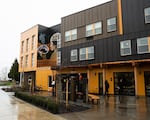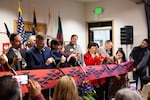If you drive down Northeast 42nd Street in Portland’s Cully Neighborhood you may come across a sight that has become very familiar: a shiny new apartment building in a changing neighborhood. But this building is special. It's a 59-unit affordable housing complex developed to address the disproportionate rate of homelessness among Native Americans in Portland.
“We have a lot of tribal members that live here in Portland, that have lived here for generations and we are able to provide housing for some of them,” Delores Pigsley, chair of the Confederated Tribes of Siletz Indians said during a ribbon-cutting ceremony.

A mural by Toma Villa adorns the exterior of Nesika Illahee in the Cully neighborhood in Portland, Ore., Wednesday, Jan. 29, 2020. Nesika Illahee is an affordable housing community developed in partnership with the Siletz tribes to address homelessness.
Erica Morrison / OPB
The name of the community is Nesika Illahee, which translates to “Our Place” in the Chinook language. The 53,000 square foot building includes a mix of units featuring studio, one, two- and three-bedroom apartments. There are laundry facilities on each floor and spaces for residents to gather and host events. Throughout, walls are adorned with murals and artwork by Native artists.
Nesika Illahee is the first housing complex to receive the U.S. Department of Housing and Urban Development’s Indian Housing Block Grant to build housing in an urban environment. Typically the funds are used to build on reservations.
“We have, per capita, the largest homeless population in Portland so we as a tribe are looking to address those needs,” Pigsley said.

From left Michael Bounocore, Portland Mayor Ted Wheeler, Margaret Salazar, Confederated Tribes of Siletz Indians Chair Delores Pigsley, and Eric Paine cut the ribbon to Nesika Illahee in the Cully neighborhood of Portland, Ore., Wednesday, Jan. 29, 2020. Nesika Illahee is an affordable housing community developed in partnership with the Siletz to address homelessness.
Erica Morrison / OPB
A variety of funders contributed to the development of the $17.7 million community, but a key player was the Confederated Tribes of Siletz Indians.
According to Oregon Housing & Community Services, the Siletz Tribe secured $1.7 million in Indian Housing Block Grant funds. As a sovereign nation, the Siletz Tribe can exercise preference to citizens of tribal nations. Twenty of the units have a specific tribal preference, following a policy defined by the Siletz Tribe.
That policy gives first preference to applicants whose head of household is an enrolled member of the Confederated Tribes of Siletz Indians or the household includes a minor or dependent child who is an enrolled Siletz tribal member.
Second preference goes to households with at least one member enrolled in a federally recognized tribe, Alaska Natives or tribes recognized by states and included in the Native American Housing Assistance and Self Determination Act.
Nesika Illahe will also support tenants in recovery, with the help of the Native American Rehabilitation Association of the Northwest. Residents will be asked to sign a drug-free and alcohol-free lease policy. A certified drug and alcohol counselor will work with residents to support them with treatment and recovery plans. NARA will also provide access for children, youth, adults and elders to a slate of services including primary and specialty care providers, women’s health support, a diabetes program, as well as dental and mental health services.

Artwork by Thomas Stream hangs outside a unit in Nesika Illahee in the Cully neighborhood in Portland, Ore., Wednesday, Jan. 29, 2020. Nesika Illahee is an affordable housing community developed in partnership with the Siletz tribes to address homelessness.
Erica Morrison / OPB
The journey to Nesika Illahee began in 2016 when Community Development Partners, an organization focused on developing and sustaining affordable housing, bought the plot of land on NE 42nd Avenue in the Cully neighborhood. After reading the report authored by Portland State University and the Coalition for Communities of Color, Eric Paine, CEO of Community Development Partners said the overrepresentation of Native communities in poverty and homelessness inspired them to partner with Native American Youth and Family Center and Native American Rehabilitation Association of the Northwest to create housing for the Native community.
“It’s an innovative project that has never been done before. No one has ever used Indian Block Grant funds in order to fund a project or create a preference for Native Americans in off-reservation urban setting,” Paine said during the ribbon-cutting ceremony. “It's really a groundbreaking idea.”
Paine said that PSU has received funding to write a report teaching others how block grant funding can be utilized to serve the community.
